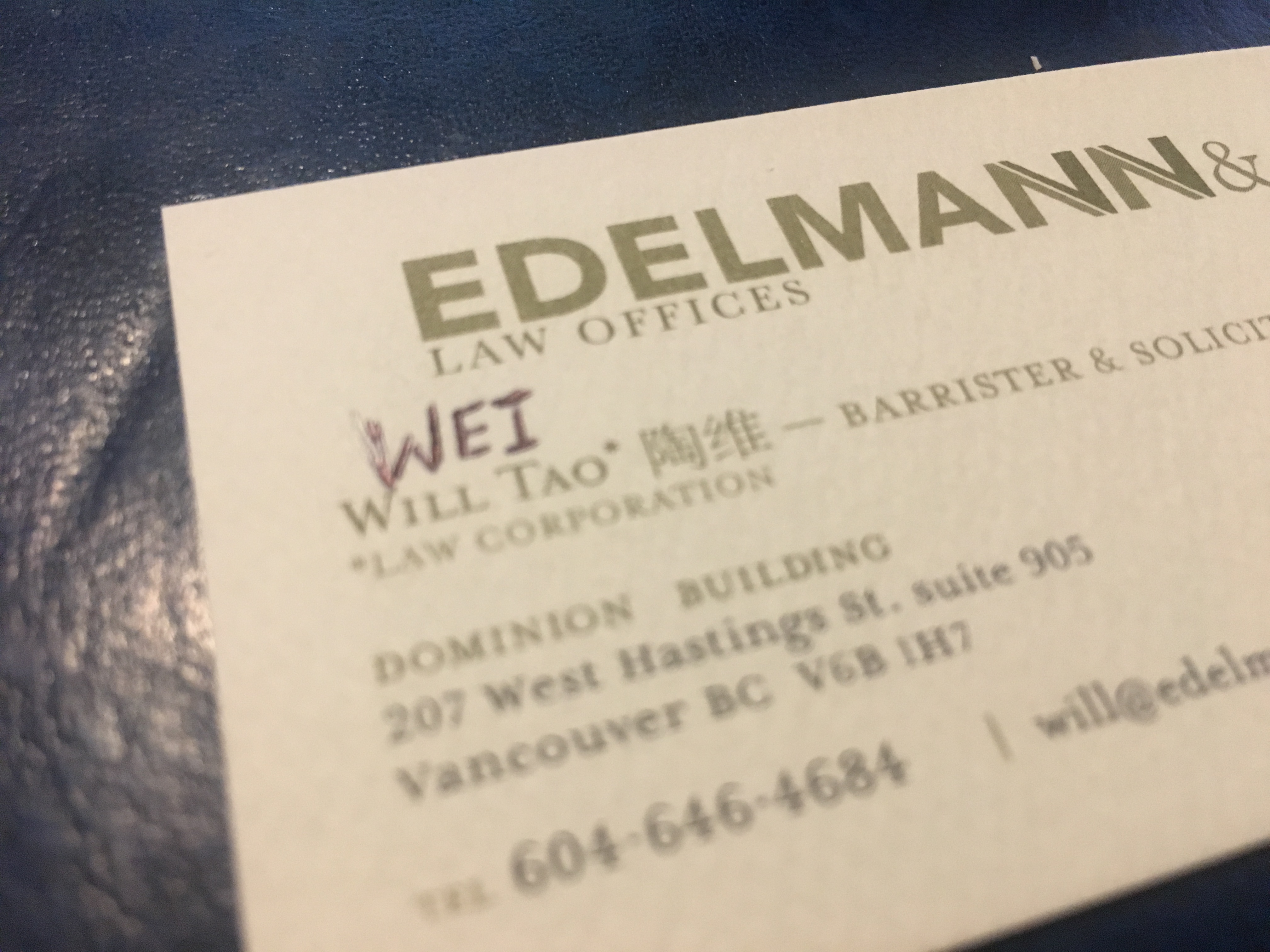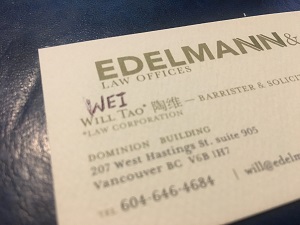“It’s Not What They Call You, It’s What You Answer To” – ascribed to comedian W.C. Fields (but I received this teaching through an April Ryan talk, March 2019, Harlem)

The Story of My Many Name Changes
I have been through a few name changes in my life.
I was born Wei Tao. Later in elementary school at my insistence (the product of trying to fit in/bullying, and apparently too many “hi wei/highway” jokes) I asked my parents to legally change it to Wei William Tao. Sometime in late high school/early university, I replaced William (which I found too British and formal) with Will – the short, cooler, ‘One Tree Hill’ version of myself.
Recently ‘names’ and ‘naming’ have come up a lot in my practice and in my life.
The past two weeks I have been working on a file where an individual from overseas is seeking to change their name with immigration due to a change of practice from their home country.
I have had another very close friend have challenges changing their maiden name.
I also have found myself looking at political campaign signs over the past elections wondering why certain individuals emphasize their first name over their last, or how someone could have an anglicized Chinese name. I wonder about white people individuals adopting Chinese names with so much meaning and power, without acknowledging their erasure of our own names and languages.
For example, the history of how Chinese surnames were anglicized is rift with discrimination and hate, yet today people from ethnic communities might see the whitening of surnames as a privilege. The assigning of biblical names was also a huge part of the residential school genocide (see here for an excellent article from 2016 by Maija Kappler on indigenous name reclamation).
Finally, just last week a group of community organizers and I had a discussion where we talked about our names. Again, it was almost an after thought. We were all about to head out, just doing last minute small talk about various race equity topics when an individual I admire and consider a mentor and leader stated “one thing we haven’t talked about are the names we ascribe ourselves.”
My Chinese Name – “Wei”
I was recently at a workshop/retreat where I was prepared to introduce my name as “Will.” The first person to introduce her name, a Chinese Canadian woman, introduced not only her English name but also her Chinese name and talked about the meaning of that name in relation to an ancestral relative. Had it known been for her braveness in bringing her birth name into the space, I would not have as well. I didn’t do a great job in describing why that name is so important to me. I wish to do so here.
I have a beautiful Chinese name. Wei (维) is the first part of Wei Duo Li Ya (维多利亚) which means the Vic in Victoria. I was born in Victoria – my name means the land where I came into this world. Will (other than the cheesy saying ‘where there’s a will there’s a way’) has literally no meaning to me. My birth name has a meaning subscribed to the struggle my parents went through as early migrants, facing overt racism, struggling up Mount Tolmie to support the family. Even through all this hardship and struggle they wanted me to adopt the physical space/place in which it was happening.
By abandoning my name “Wei” have I abandoned those stories and erased them from my being and my family’s collective memory?
Out of every one in my family I was the only one to primarily stick with his adopted white name. For me, there was always this fear and concern that if my name was seen as Wei Tao there would be assumptions of me being an immigrant, a newcomer, and someone without language skills.
The last time I heard “Wei Tao” was a few years ago at a university alumni event. The name tag had Wei Tao and I distinctly remember scribbling Will over top of it in Sharpie Pen. I had apparently won a raffle in which they called out “Wei Tao” and it took me twenty seconds to realize that it was actually me. Needless to say they almost pulled a new name out of the hat before I stood up to claim my prize.
My Legal Name vs. My Given Name – and the Legal Profession
As a lawyer, there are many moments that make you pause and think. Generally this is a good thing when you are in this profession. For me, this occ every time when I am writing or signing my name on documents. Right now, the rule I apply is when i am required to put my legal name (i.e. swearing affidavits, or submitting Access to Information Forms, I put my name “Wei William Tao”) or everything else I will use “Will Tao.”
I actually love the names of my immigration clients from different places around the world. I particularly love the “Singh,” “Kaur,” and biblical ceremony involved in Punjabi-Sikh names, the way certain Euro-Russian families will add an a or not to surnames of their parents, of Iranian and Sri Lankan names of multiple syllables, and of Latinx names where they pay hommage to both sides of the family. I also love learning about Indigenous names – particularly when the story behind the name and the clans on different sides of the family are introduced. I am proud of the Tao (cc: my post here about my ancestral home town) but why am I so reticent to adopt the “Wei.” I am in a profession where marketability, presentation, professionalism, and competency is everything. Why is Will Tao more competent and presentable than Wei Tao .
Also, as a legal advocate – how do I fight for community – to ask for more non-white names of spaces, to ask for colonial names to be removed (a process known as “un-naming”), if I cannot do it myself, to my own name.
“We Cannot Pronounce Your Name”
My spouse is known to most as “Olivia.” She had previously chosen another English name but was told to change it.
For a period of time she reverted back to her Chinese name Xiaoqin when she was in English classes, adopting the short form “Qin” for hopeful ease. A Korean-Canadian instructor told my spouse, to change her name. She said “people could not pronounce it” and drew a metaphoric “You know how Japanese were called Japs” to try and convince her [Trust me, I was in disbelief as well. This is a true story].
This was not the first time this had happened. She had first chosen her original English name in China when the English instructors asked everyone to choose a white name creating many “Michael‘s” and “Mary‘s.”
Not too long ago, her Human Resources (HR) recruitment class, the HR instructor out of the blue asked “I have been wondering why are there students with two names – a Chinese name and an English name beside it.” Perhaps this comment was coming from the perspective of some one with privilege of having two white names. Again, one of the many microaggressions that students (particularly migrant newcomer students) face in their early education in Canada and in the job market. These are the types of implicit biases (one’s I have probably adopted myself on the other side reviewing resumes) which continue to hold down people of colour at staggering impacts. See article here from CBC in 2018 talking about this.
Also – on a related note – what should we do about the mispronunciation of our names? While it is a meaningful gesture to have our names reviewed with us before introduced, it is even more meaningful when we have a person of colour who speaks the language share it or even space to discuss it’s origins rather than to just have us cringe at it’s mispronunciation or give a “nice try” forced Starbucks-pick up line smile.
Asking Our Spouses to Take On Our Names
The history of Chinese women with respect to maintaining their surnames is a fascinating one. I won’t repeat it but direct you to this New York times article here.
The usual practice is to have children take on the surname of the father, carrying on the practice of patriarchy.
Recently, someone I really admire in the community told me he went against cultural norms and had his son take on his female spouse’s surname. This is beautiful and I only hope more individuals can do things like this, particularly where the histories of naming is so patriarchal.
We also need to give space to women who choose to adopt their spouses white surnames. Too often in our communities, we are ostracizing women for doing this while not recognizing we are doing the same thing with our own first names but more importantly in the way we act in our workplaces and to other white dominant culture spaces.
Would I Be Brave Enough to Change My Name?
One mentor during the community organizer meeting talked about when he messaged his professional network and changed his name back to his Indigenous name from his adopted name. He mentioned it was quite a change.
What is stopping me from the similar liberation?
I look at the name Wei and I should feel love and a sense of place and grounding but I see foreignness and the judgments of those who see, hear, and try to repeat it. The last time I heard. Just earlier this year, I published my Chinese name in a piece I wrote for a legal publication. It felt liberating but truthfully part of me thought that if I put that name it would be less “Google-able” and separate from my legal work.
Over the next few years I will be having this internal discussion with myself. Feel free when you meet or see me to try and call me “Wei.” Maybe even the dread, “High Wei.” Perhaps you can even honour some of our cultural traditions, and call me Tao Wei (which my mom does) with the surname first. I invite you to see how I react, hopefully with more familiarity will come more acceptance and more courage than I have historically show.
My Future Kids’ Names
I am not sure if any other young couples (with no children but plans to have them) have this activity where you “brainstorm” your future children’s name. Sometimes it will be a random experience or place we visit and we will decide that this sounds like a good name. I likely, and maybe unfortunately, will still have my future child adopt an English name. One thing for sure is it will be unique and have meaning.
However, we have decided importantly that our child will have a Chinese name. I am not sure yet how to give it meaning: Do we name our child after an ancestor? Take certain characters from different relatives? Take two characters from a chengyu (Chinese idiom) to give it additional meanings? Unfortunately, my own knowledge of the Chinese language also fell victim to my early assimilation efforts as the second-generation product of first generation migrants. I will have to lean on my spouse more, but perhaps we all should.
Perhaps we should start learning these names and ask consent for the sharing of more stories about our names. Perhaps, ending on where the mentor started, we should have a longer conversation about this.
“When we lose our names, we lose the words given to us to define ourselves” – Me

